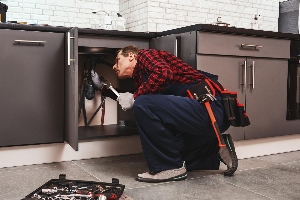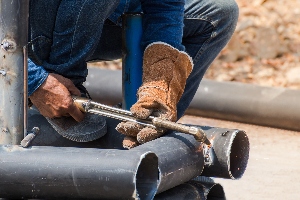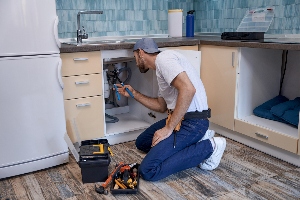Hard water, characterized by high mineral content such as calcium and magnesium, can significantly impact the efficiency and lifespan of your water heater. As minerals accumulate, they form scale deposits inside the water heater, which can lead to increased energy consumption and reduced heating efficiency. This buildup causes water heaters to work harder, resulting in higher energy bills and a shorter appliance lifespan.
Addressing hard water issues is crucial for maintaining an efficient water supply system. You may not realize it, but the mineral content in your groundwater can also affect the performance of other plumbing fixtures and appliances. With regular maintenance and timely interventions, you can mitigate the negative effects of water hardness.
At One Call Plumbing, we specialize in professional plumbing services to keep your systems running smoothly. Our team is licensed, bonded, and insured, ensuring top-tier water heater repairs, installations, and maintenance for residents in Greenville and Spartanburg.
Chemistry of Hard Water and Its Interaction With Water Heaters
Hard water, characterized by high concentrations of calcium and magnesium, significantly impacts water heaters. This leads to mineral buildup, scale formation, and deterioration of heating elements and tank integrity, affecting system efficiency and longevity.
Understanding Hard Water
Hard water contains elevated levels of calcium and magnesium ions. These minerals originate from dissolved compounds like calcium carbonate and magnesium sulfate present in the water supply.
When hard water is heated, the solubility of these minerals decreases, leading to the precipitation of calcium carbonate and other compounds. This process begins the cycle of mineral deposition that adversely affects water heaters.
Mineral Buildup and Scale Formation
Mineral buildup primarily involves the accumulation of calcium, magnesium, and other deposits inside your water heater. This buildup forms a hard, chalky substance known as limescale or scale.
Scale formation occurs when heated hard water releases its dissolved minerals, causing them to crystallize on heated surfaces. Over time, these crystals aggregate, forming thick layers of limescale that reduce efficiency and increase energy consumption.
Effects on Heating Elements and Tank Integrity
The heating elements in water heaters are particularly vulnerable to limescale buildup. When scale accumulates on these elements, it acts as an insulating layer, forcing the heater to work harder to maintain water temperature.
Limescale buildup also leads to inefficient heating and prolonged recovery times. Additionally, mineral deposits can cause sediment accumulation at the bottom of the tank, accelerating corrosion and compromising the tank's structural integrity.
This can result in premature failure of the water heater, necessitating costly repairs or replacements.
Operational Impacts and Maintenance of Water Heaters
Hard water can significantly affect the performance and longevity of water heaters. Understanding the operational impacts and necessary maintenance can help you mitigate these issues and extend the life of your system.
Reduced Efficiency and Increased Energy Costs
Mineral buildup from hard water, particularly calcium and magnesium, can accumulate in your water heater. This buildup forms a layer of insulation between the heating element and the water, making it harder for the heater to transfer heat efficiently. As a result, your system must work harder, leading to increased energy costs. Over time, this inefficiency can add significantly to your water heating bills.
Maintenance and Flushing Requirements
To combat the effects of hard water, regular maintenance, including flushing your water heater, is essential. Flushing helps remove the sediment and mineral buildup, ensuring your heater operates more efficiently. It’s recommended to flush your heater at least once a year. Routine preventative maintenance by licensed professionals can also help identify and address potential issues before they lead to costly repairs and damage.
Life Expectancy and Frequent Repairs
The lifespan of water heaters in areas with hard water is often reduced due to constant repair needs. Mineral buildup can cause the heating element to overheat and fail. Additionally, sediment can lead to corrosion and leaks inside the tank, necessitating frequent repairs. Regular professional servicing can help prolong the life of your water heater and reduce the frequency of repairs.
Water Heater Types and Their Vulnerability to Hard Water
Different types of water heaters react to hard water in unique ways. Understanding these differences can help you protect your water heater from damage.
Conventional Tank-Based Water Heaters
Conventional tank-based water heaters, including both electric and gas-powered models, store hot water until needed. Hard water significantly affects these systems.
Mineral deposits from hard water settle at the bottom of the tank. This accumulation forms a layer of scale that reduces the heater's efficiency, leading to higher energy bills. Additionally, sediment buildup can cause overheating, resulting in potential failure of the heating elements.
Regular maintenance, such as flushing the tank, is crucial. Routine inspections can also preempt major issues, saving you from expensive repairs.
Tankless and High-Efficiency Water Heaters
Tankless water heaters heat water directly without storing it in a tank. These units, often electric or gas-powered, boast higher energy efficiency than conventional heaters. Yet, hard water’s impact remains a concern.
Scale buildup in the heat exchanger is a major problem. This reduces its efficiency, forcing the unit to work harder and increasing the risk of premature wear. Regular descaling is essential to keep it running smoothly.
Proper maintenance ensures your tankless water heater delivers on its promise of efficiency and reliability.
In conclusion, protecting your water heater from hard water damage requires regular maintenance and professional intervention.
Mitigating Hard Water Effects and Long-Term Solutions
Addressing hard water requires strategic actions like water softening, descaling, and expert assessments. These strategies can protect your plumbing and appliances.
Water Softening and Filtration Systems
Installing a water softener can reduce the concentrations of excess minerals. A salt-based water softener swaps calcium and magnesium ions with sodium ions, yielding soft water. This change minimizes limescale buildup, safeguarding your water heater and plumbing fixtures.
Water filtration systems also enhance water quality by removing impurities and excess minerals. Combining a water softener with a filtration system can significantly improve your water quality, prolonging the lifespan of your appliances and preventing issues like clogs and stains.
Consider a water test kit to measure your water hardness before choosing a solution. Our team at One Call Plumbing can help you select and install the best system tailored to your needs.
Alternative Descaling Methods
Regular maintenance can mitigate hard water damage. Physically flushing your water heater removes accumulated sediment, which can be done with vinegar as a descaler. This method dissolves mineral buildup, preventing blockages and corrosion.
Alternatively, you can use descaling agents available on the market. Ensure you follow the manufacturer's instructions and safety guidelines. These methods help ensure efficient water heater operation and prevent long-term breakdown due to mineral accumulation.
One Call Plumbing can perform professional descaling services, ensuring effective and safe procedures tailored to your water heater model.
Professional Assessment and Water Quality Improvement
A comprehensive water test by a professional can identify water quality issues.
We offer professional assessments to detect early signs of hard water-related damage, ensuring timely interventions. With expertise in plumbing repairs, installations, and maintenance, we can improve your water quality effectively.
From installing corrective devices like water softeners to performing regular maintenance, our team ensures your water system operates smoothly, prolonging the life of your appliances and avoiding costly repairs.
Trust the experts at One Call Plumbing to help you tackle hard water problems and maintain the longevity of your water heater.












